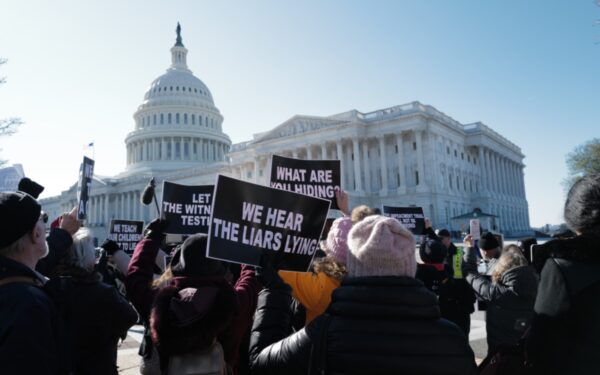What’s the definition of a lie in a post-truth world? Is it spreading misleading information? Leaving out key facts to paint a deceptive picture? Answering a subtly different question to the one asked in order to give the answer you want?
That’s all very abstract so let’s look at an example. Here is what Attorney General Jeff Sessions said during his confirmation hearings. When asked what he would do if there was “any evidence that anyone affiliated with the Trump campaign communicated with the Russian government in the course of this campaign”, Sessions said he was “not aware of any of those activities…. I didn’t have – did not have communications with the Russians”. He was also specifically asked, in writing: “Have you been in contact with anyone connected to any part of the Russian government about the 2016 election, either before or after election day?” His answer was “No.”
Both of these statements were untrue. In fact Sessions himself had met with the Russian ambassador Sergei Kislyak on two occasions just months before he answered those questions – one of which was a meeting in his own Senate office.
Sessions and his supporters now claim that this does not constitute lying under oath. Their wiggle-room seems to rest on the fact that Sessions alleges that he met with Kislyak in his capacity as a representative of the Senate Armed Services Committee, not as a member of the Trump campaign. Therefore his meeting does not constitute “anyone affiliated with the Trump campaign [communicating] with the Russian government”. He also says he did not discuss the 2016 election, making his answer to the written question technically true.
These are the excuses of a five-year-old child, not a Senator and the leading lawyer of the United States government. There is currently a debate raging about whether Sessions actually perjured himself, but even if his false statements are not prosecutable, his answers were clearly misleading and factually incorrect.
In any other administration, that would be a fireable offence. Sessions says he did not discuss sensitive or illegal information with Kislyak, but who can believe him now? He has shredded any credibility that he can act as an effective and impartial Attorney General, and embroiled the Trump White House is a fresh quagmire of Russian ethics conflicts.
But, in a move that would be shocking if it weren’t so predictable, President Trump has come out in his defence:
“Jeff Sessions is an honest man. He did not say anything wrong. He could have stated his response more accurately, but it was clearly not intentional.”
Note the mischaracterisation of what Sessions did. According to Trump, he didn’t lie – he unintentionally gave information that could have been more accurate. (How someone could unintentionally forget to mention that they personally met with a Russian official when asked about meeting Russian officials is not made clear.)
We have seen this before, just weeks ago, with Trump’s disgraced (and now former) National Security Advisor Michael Flynn. Flynn lied about talking to Kislyak about US sanctions on Russia – he lied to the media, he lied to the FBI, and according to the White House he lied to Vice President Mike Pence. What did his resignation letter say?
“I inadvertently briefed the Vice President Elect and others with incomplete information regarding my phone calls with the Russian Ambassador.”
Note the similarities: “inadvertently” with “clearly not intentional”, “incomplete information” with “could have stated his response more accurately”. This is an administration that cannot admit or accept the truth: these men lied. Not only did they lie, but they tried to cover it up, and the only reason we are talking about it now is thanks to the hard work of investigative journalists working with inside sources to bring it to light.
There is an argument that Sessions did nothing wrong by meeting Kislyak, that his role on the Armed Services Committee meant he met many ambassadors. This may be true, but it in no way excuses him from deceiving the Senate while under oath. Even more troubling is the fact that, until last night, Sessions had adamantly refused to recuse himself from the Justice Department’s investigation into ties between the Russian government and the Trump campaign. After Michael Flynn resigned, congressional Democrats pointed out that Sessions, who had worked on the campaign, could not even hope to be impartial in leading the investigation and called on the Attorney General to appoint a special prosecutor. Sessions ignored them.
Now, as of Thursday night, he has had a change of heart. Sessions announced that he would indeed recuse himself, stating that Justice Department staff had “said that since I had involvement with the campaign, I should not be involved in any campaign investigation. I have studied the rules and considered their comments and evaluation. I believe those recommendations are right and just.”
Where was this deference to the rules two weeks ago? Non-existent. Like Flynn, Sessions only began to back down once he saw the truth was already out. It seems he would have been happy to risk the integrity of the Justice Department by investigating the case himself, despite knowing he had major conflicts of interest, had his deception not been exposed.
There are decent, hard-working, honourable Republicans in Congress. They should be shocked that the White House is trying to engineer a coverup of Watergate proportions. If there is evidence that the Trump team worked with the Russian government to win the election – and the evidence is mounting, with new reports that Trump’s son-in-law also met with the Russian ambassador – that is a crime every American politician, Democrat or Republican, should want unmasked. The country, and the world, needs to know why these men keep lying about their contact with Russia, and why the White House keeps protecting them.



